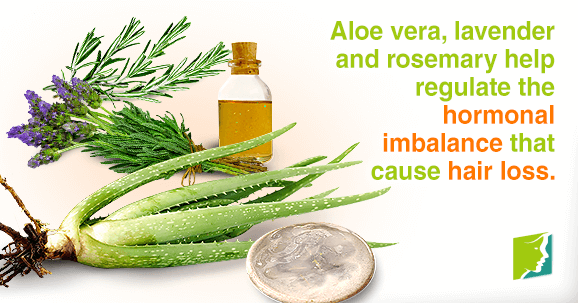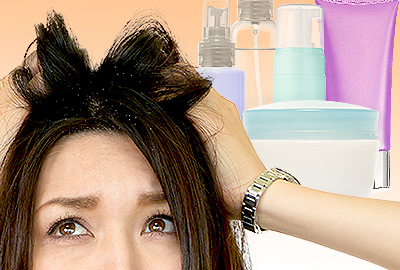For many women, hair loss is one of menopause's most unwelcome symptoms. Menopausal hair loss occurs when hormone levels in the body change; while little is understood about the specifics of this, it is thought that reduced testosterone production affects hair follicle health and causes hair to fall out, resulting in thinness and sometimes even patches of baldness. While total baldness is extremely unlikely to occur during menopause, hair loss can be very difficult to cope with. These natural remedies will help reverse the effects of menopausal hair loss by stimulating hair growth.
Herbal Help
Using specific medicinal herbs may be useful in nourishing existing hair and stimulating blood circulation and activity in the scalp. Infusing dried herbs with water to make medicinal teas can help achieve this effect, but applying essential oils directly to the scalp will help counteract hair loss more directly. The following herbs can be helpful in managing hair loss:
Aloe vera
This herb often used in hair and skin treatments due to its considerable health-boosting antioxidant properties. The gel from the leaves contains significant amounts of vitamin E for hydrating and nourishing the scalp to promote natural hair regrowth. You can also apply aloe to existing hair to improve its condition and add shine.
Lavender
The essential oil of this herb helps stimulate the hair follicles.
Rosemary
This herb has anti-androgenic functions to help regulate the hormonal imbalances that cause hair loss during menopause.
Massage
A gentle head massage will stimulate blood circulation to the scalp. Massage your fingertips over your scalp regularly to boost hair growth, and combine this with medicinal herbs to maximize this effect.
Be Gentle
It's important to take care of hair to avoid exacerbating hair loss. Try to avoid twisting your hair into tight styles, dying or chemically treating it, or using heat styling products, as these are all damaging and make hair loss more likely.
Take it Easy
Stress has a number of effects on the body, including hair loss. Problematically, hair loss can also contribute to stress. Make sure you take time to relax every day by reading, meditating, or exercising - whatever makes you feel calm and happy - to help keep your stress levels down.
Increase Your Iron
The primary function of iron is to carry oxygen in the bloodstream for healthy red blood cells and blood circulation. Increasing your intake of iron by eating more red meat, poultry, nuts, seeds, and legumes will boost blood circulation to the scalp to stimulate hair regrowth. Drink a glass of orange juice or have a citrus fruit with your iron sources, as vitamin C assists iron absorption in the body.
Boost Your Biotin
Biotin is a mineral that has been linked to hair growth. Increase your intake of biotin by incorporating more lettuce, chard, carrots, and tomatoes into your diet.
While there is no known “cure” for menopausal hair loss, these natural treatments will help reverse the effects of the symptom by stimulating hair regrowth. This will take some time and require patience, as the average hair grows at a rate of around half an inch per month. In the meantime, try not to focus on losing hair, as stress will only make things worse. Try to stay positive, making healthy adjustments to your lifestyle and taking care of the hair you do have.
Sources
- Bhat, G. , Kudva, P. & Dodwad, V. (2011). Aloe vera: Nature's soothing healer to periodontal disease. Journal of Indian Society of Periodontology, 15(3), 205-209. doi: 10.4103/0972-124X.85661
- Dinh, Q.Q. & Sinclair, R. (2007). Female pattern hair loss: Current treatment concepts. Clinical Interventions in Aging, 2(2), 189-199. Retrieved from http://www.ncbi.nlm.nih.gov/pmc/articles/PMC2684510/
- McKinley Health Center. (2010). Dietary sources of iron. Retrieved May 26, 2014, from http://www.mckinley.illinois.edu/handouts/dietary_sources_iron.html
- Murata, K. et al. (2013). Promotion of hair growth by Rosmarinus officinalis leaf extract. Phytotherapy Research, 27(2), 212-217. doi: 10.1002/ptr.4712
- National Center for Complementary and Alternative Medicine. (2012). Lavender. Retrieved May 26, 2014, from http://nccam.nih.gov/health/lavender/ataglance.htm
- National Health Service UK. (2013). Hair loss - Treatment. Retrieved May 26, 2014, from http://www.nhs.uk/Conditions/Hair-loss/Pages/Treatment.aspx
- National Institutes of Health. (2014). Female pattern baldness: MedlinePlus Medical Encyclopedia. Retrieved May 26, 2014, from http://www.nlm.nih.gov/medlineplus/ency/article/001173.htm
- Park, S.Y. et al. (2013). Iron plays a certain role in patterned hair loss. Journal of Korean Medical Science, 28(6), 934-938. doi: 10.3346/jkms.2013.28.6.934
- University of Maryland Medical Center. (2013). Alopecia. Retrieved May 26, 2014, from http://umm.edu/health/medical/altmed/condition/alopecia




